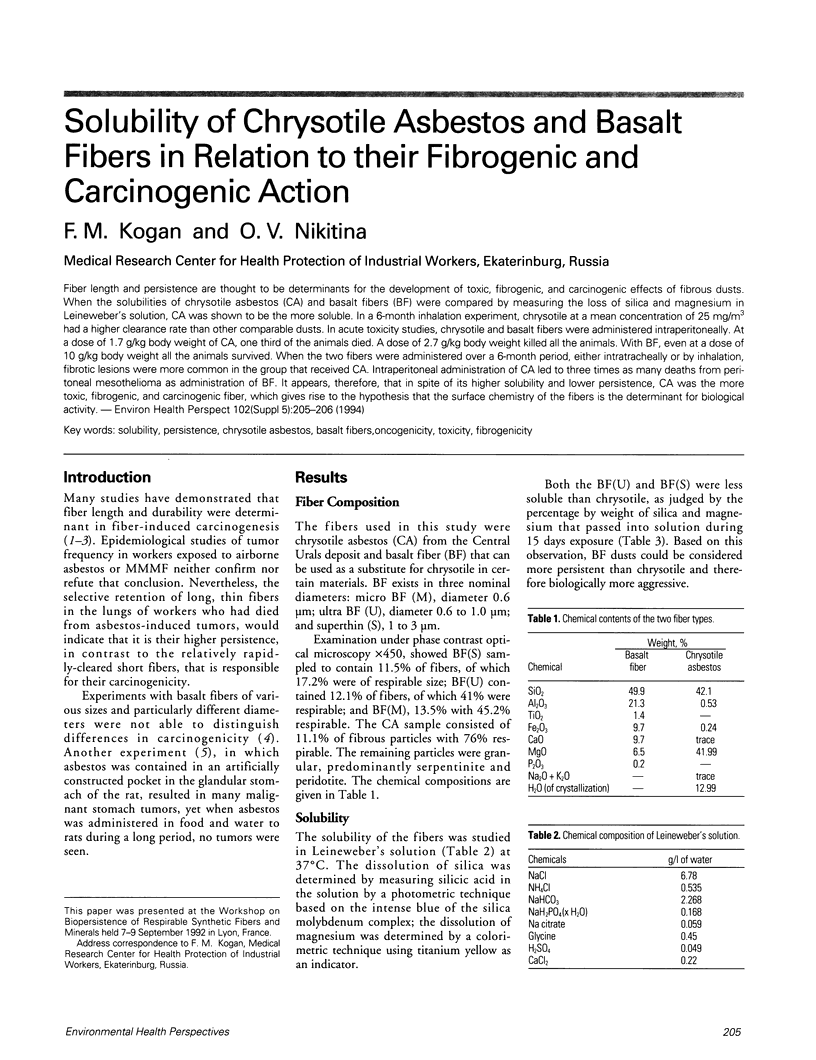Abstract
Fiber length and persistence are thought to be determinants for the development of toxic, fibrogenic, and carcinogenic effects of fibrous dusts. When the solubilities of chrysotile asbestos (CA) and basalt fibers (BF) were compared by measuring the loss of silica and magnesium in Leineweber's solution, CA was shown to be the more soluble. In a 6-month inhalation experiment, chrysotile at a mean concentration of 25 mg/m3 had a higher clearance rate than other comparable dusts. In acute toxicity studies, chrysotile and basalt fibers were administered intraperitoneally. At a dose of 1.7 g/kg body weight of CA, one third of the animals died. A dose of 2.7 g/kg body weight killed all the animals. With BF, even at a dose of 10 g/kg body weight all the animals survived. When the two fibers were administered over a 6-month period, either intratracheally or by inhalation, fibrotic lesions were more common in the group that received CA. Intraperitoneal administration of CA led to three times as many deaths from peritoneal mesothelioma as administration of BF. It appears, therefore, that in spite of its higher solubility and lower persistence, CA was the more toxic, fibrogenic and carcinogenic fiber, which gives rise to the hypothesis that the surface chemistry of the fibers is the determinant for biological activity.
Full text
PDF

Selected References
These references are in PubMed. This may not be the complete list of references from this article.
- Kogan F. M., Vanchugova N. N., Frasch V. N. Possibility of inducing glandular stomach cancer in rats exposed to asbestos. Br J Ind Med. 1987 Oct;44(10):682–686. doi: 10.1136/oem.44.10.682. [DOI] [PMC free article] [PubMed] [Google Scholar]
- Pott F., Ziem U., Reiffer F. J., Huth F., Ernst H., Mohr U. Carcinogenicity studies on fibres, metal compounds, and some other dusts in rats. Exp Pathol. 1987;32(3):129–152. doi: 10.1016/s0232-1513(87)80044-0. [DOI] [PubMed] [Google Scholar]
- Stanton M. F., Wrench C. Mechanisms of mesothelioma induction with asbestos and fibrous glass. J Natl Cancer Inst. 1972 Mar;48(3):797–821. [PubMed] [Google Scholar]
- Wagner J. C., Berry G., Skidmore J. W., Timbrell V. The effects of the inhalation of asbestos in rats. Br J Cancer. 1974 Mar;29(3):252–269. doi: 10.1038/bjc.1974.65. [DOI] [PMC free article] [PubMed] [Google Scholar]
- Wagner J. C., Berry G., Timbrell V. Mesotheliomata in rats after inoculation with asbestos and other materials. Br J Cancer. 1973 Aug;28(2):173–185. doi: 10.1038/bjc.1973.134. [DOI] [PMC free article] [PubMed] [Google Scholar]



